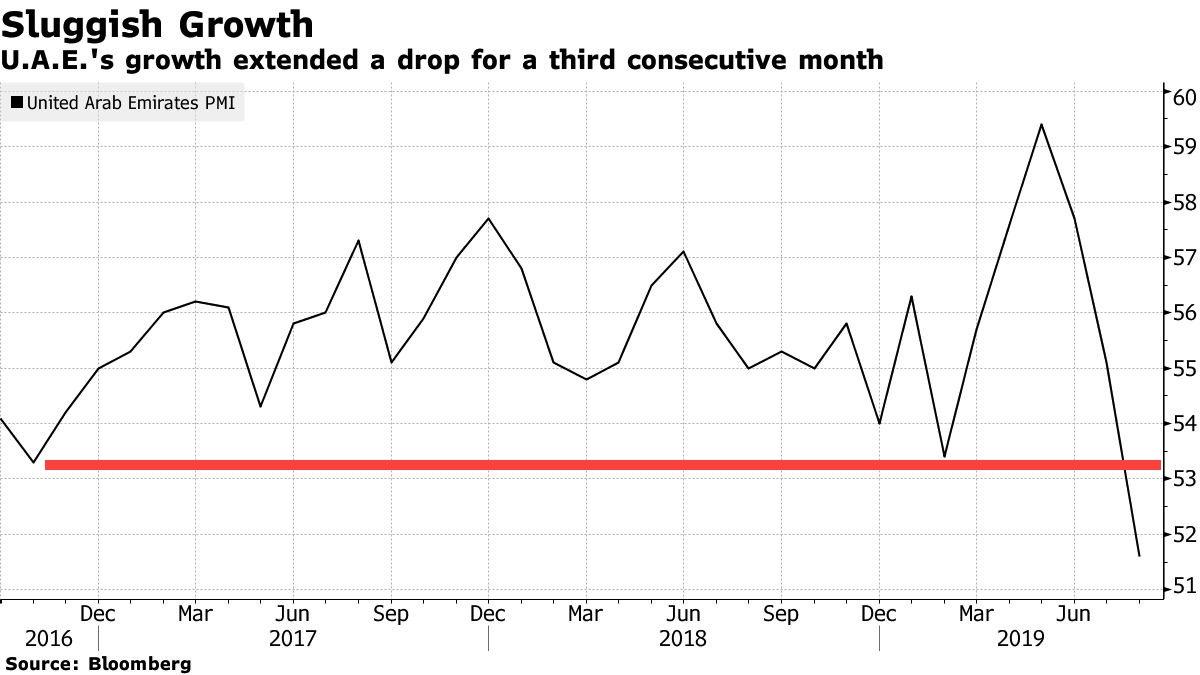An economic downturn, or below-trend growth, has been festering in Dubai’s economy since 2014, is expected to continue through 2022 due to depressed oil prices, a global synchronized slowdown, turmoil from the US and China trade war, and political uncertainties in the Middle East, Standard and Poor’s said Tuesday.
The international rating agency said deterioration in real estate and tourism sectors have weighed on the domestic economy.
Several days ago, we reported new data from Cavendish Maxwell’s Dubai House Price Index via Property Monitor that showed Dubai house prices fell to their lowest levels in June, not seen since the 2008 financial meltdown. Besides low oil prices, trade wars, global growth decline, and instability in the Middle East, there was another factor leading to the slump in real estate.
There’s a massive housing glut in the country that could take years to rebalance.
Besides housing, Dubai’s debt situation is deteriorating. Public debt has reached $124 billion, or 108% of GDP, split between the government and state-linked companies, the report said.
Dubai is a city-state that is one of seven sheikhdoms that make up the UAE. Growth in the UAE expanded a mere 1.94% in 2018, the lowest since 2010 when the city was still recovering from the financial crisis.
S&P expects Dubai’s GDP to expand 2.4% this year, thanks to the construction of projects related to the international trade exhibition Expo 2020 next year. But says growth afterward will likely fall below trend <2% through 2022.
The IHS Markit UAE PMI fell sharply to 51.6 in August 2019 from 55.1 in July. The latest PMI data pointed to the slowest expansion in the non-oil private sector in eight years, as output growth declined to a 6-year low.

The rating agency said the trade war and geopolitical uncertainties around the Strait of Hormuz would decrease international trade in the region, could negatively affect Dubai’s Port of Jebel Ali in the coming quarters.
The bust cycle is expected to gain momentum through the year. Several days ago, the government suspended work on Al Maktoum airport, was supposed to be the world’s biggest airport with up to 250 million passengers per year, but the project had to be put on hold due to a faltering economy.
Dubai ruler and UAE Prime Minister Sheikh Mohammed bin Rashed has taken several measures to boost the domestic economy, in hopes to attract new foreign direct investments by easing residency and business rules.
So can Dubai survive the next global recession?
We’ll find out shortly as the world is likely entering, or has already entered a global trade/manufacturing recession.
The highly leveraged city-state, already reeling from weaker oil prices and a housing bust, is a symptom that the most vulnerable fall first.
![]()
Zero Hedge’s mission is to widen the scope of financial, economic and political information available to the professional investing public, to skeptically examine and, where necessary, attack the flaccid institution that financial journalism has become, to liberate oppressed knowledge, to provide analysis uninhibited by political constraint and to facilitate information’s unending quest for freedom. Visit https://www.zerohedge.com


